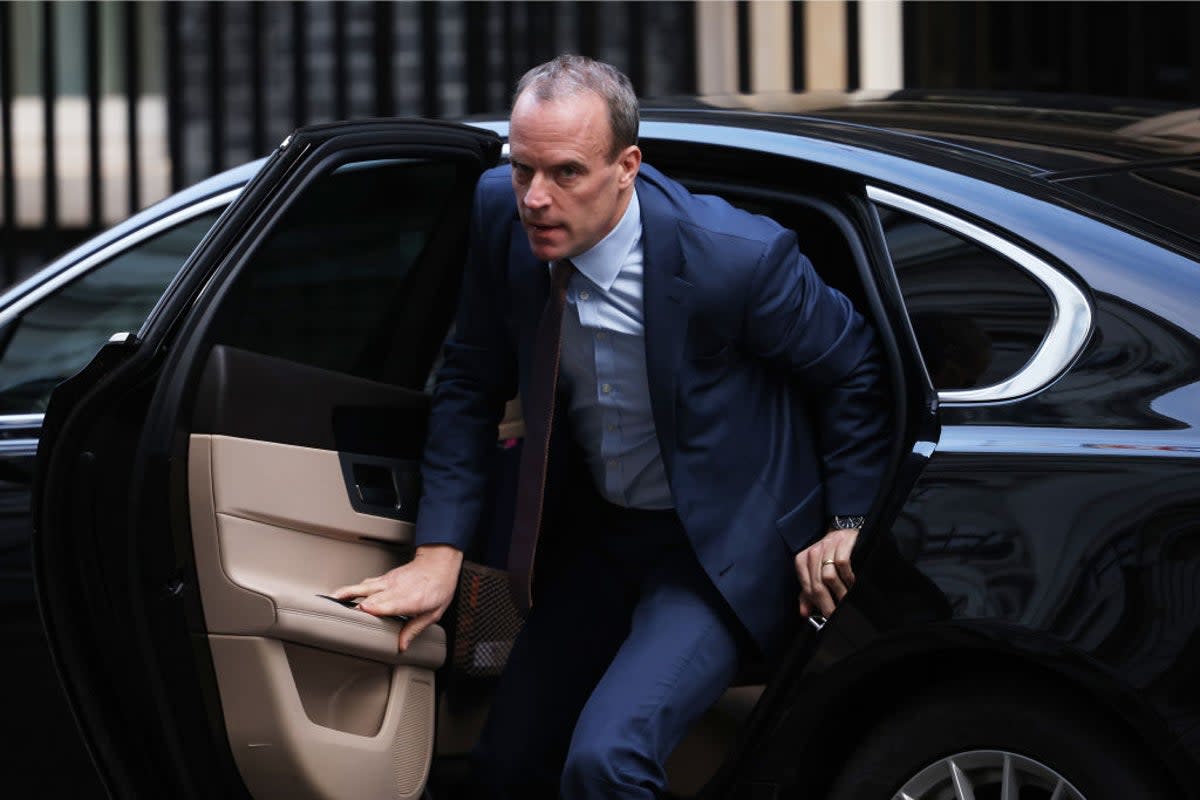Who is Dominic Raab? The martial arts black belt forced to resign over bullying claims
Dominic Raab, a karate black belt, had developed a reputation in Westminster for being a bit of a no-nonsense political operator, unafraid to speak his mind.
The boxing enthusiast has never been one to pull his punches when dealing with civil service officials - and even some of his own colleagues.
But his confrontational approach to the job has now cost him his place in Cabinet, after Adam Tolley KC concluded his investigation into multiple bullying complaints against the justice secretary.
Mr Raab announced his resignation the day after Rishi Sunak, the prime minister, received the report. The justice secretary always said he would resign himself if any of the allegation against him were upheld.
Constituency
Mr Raab, the MP for Esher and Walton, was first elected to parliament in 2010 and quickly rose up the ministerial ranks.
Career
Theresa May appointed Mr Raab as a justice minister in 2017, before moving him to housing, communities and local government in January of the following year.
A committed Brexiter, Mr Raab was appointed secretary of state for leaving the EU in 2018, where he spent just over a year.
He was made foreign secretary by Boris Johnson after losing out to the former PM in the Tory leadership campaign in the summer of 2019.
In September 2021 Mr Raab was relieved of his duties at the Foreign Office following his disastrous handling of the UK withdrawal from Afghanistan.
To soften the blow, Mr Johnson made Mr Raab his deputy PM - a role that he lost under Mr Johnson’s successor, Liz Truss, but regained when Mr Sunak entered No 10.
Brexit hard man
A Foreign Office lawyer before turning to politics, Mr Raab was previously known to play up his image as a Brexit hard man in an attempt to win support from the Tory right and quit his role as justice secretary in protest against Ms May’s approach to the issue.

During the 2019 leadership contest, he said he would “probably not” describe himself as a feminist although he was “all for working women making the very best of their potential”.
In 2020, at the height of Black Lives Matter protests, the married father-of-two suggested “taking the knee” was a symbol of subjugation which originated in TV drama Game Of Thrones, adding he only kneels for “the Queen and the missus when I asked her to marry me”.
He was challenged on his comments again in December 2021 when he appeared before the Joint Committee on Human Rights for the first time after becoming justice secretary.
In a frosty exchange, Mr Raab insisted he was an “ardent champion of equality” after then chairman Harriet Harman told him to “eat his words” for branding feminists “obnoxious bigots”.
Personal life
The son of a Czech-born Jewish refugee who fled the Nazis in 1938, Mr Raab was brought up in Buckinghamshire and studied law at Oxford University before switching to Cambridge for his masters.
He competed in karate for 17 years, winning two British southern region titles, and making the UK squad.
Mr Raab also enjoyed boxing at university and claims it has been “pretty good in terms of preparing me for other big moments”, although “nothing has ever wracked me with nerves quite the same way”.
Where did Dominic Raab go to school?
Mr Raab went to Dr Challoner’s Grammar School in Amersham, Buckinghamshire, and studied law at Lady Margaret Hall, Oxford. He later studied for a Masters at Cambridge, winning the Clive Parry Prize for International Law.
Bullying inquiry
Adam Tolley KC, a senior employment lawyer, was appointed in November to investigate a number of allegations made against Mr Raab by civil servants who worked in his departments. Dozens of officials are thought to be involved in eight formal complaints relating to bullying.
Mr Tolley has taken a thorough approach to examining the allegations, questioning the deputy PM multiple times among other interviewees as well as taking written evidence.
Senior civil servants in the three government departments headed by Mr Raab – Antonia Romeo, the permanent secretary at the Ministry of Justice, Simon McDonald, a former permanent undersecretary at the Foreign Office, and Philip Rycroft, a former permanent secretary at the now-defunct Department for Exiting the European Union – are also understood to have spoken to the inquiry.
The deputy PM has denied the allegations but pledged to resign if he is found to have bullied officials.
He has insisted he believes “heart and soul” that he is not a bully, but defended his “forthright” approach to his work.
Some officials at the Ministry of Justice (MoJ) are reportedly preparing to quit if the PM chooses to keep Mr Raab in government because it would be “demoralising” for staff.
